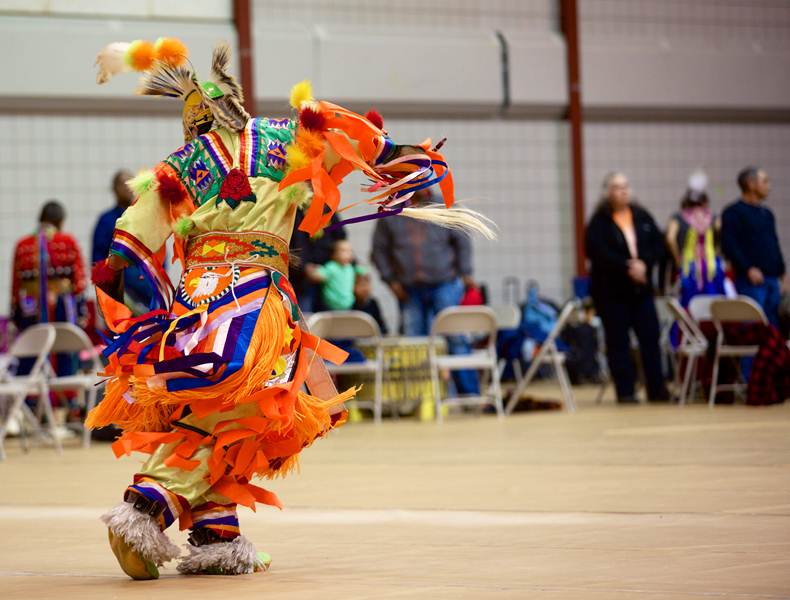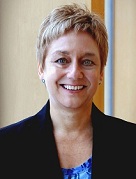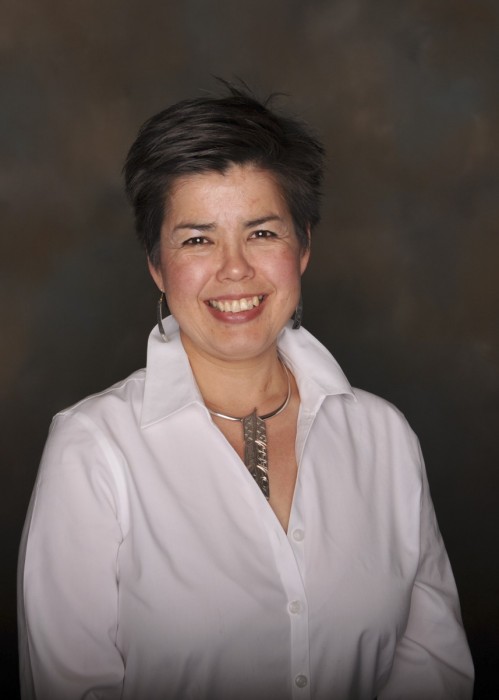
A dancer at U of M Graduation PowWow.
“Decolonizing”: What is it and what can we do at the university?
The University of Manitoba explored an important topic on Feb. 5 and 6: “Decolonizing the University: What Can We Do?”
That was the question it posed to itself and community members as part of a two-day event hosted by the Office of the Vice-President (Academic) and Provost.
UM Today spoke about the event with Deborah Young, executive lead, Indigenous achievement, and Janice Ristock, vice-provost (academic affairs).
They said this an important topic for our university.
“Indigenizing is about including and applying Indigenous knowledge to our practices, courses and curriculum and providing a welcoming and inclusive environment,” Ristock says, “while decolonizing involves the decentering of western practices or approaches and western ways of knowing in courses and curriculum. We need both.”
Q&A with Deborah Young and Janice Ristock
UM TODAY: What are some aspects of opening up this question to each audience — general university audience and administrators?
Janice Ristock: Each audience needs to think about how they are located in the university and what they can do to work towards the larger goal of decolonizing the university. The session for academic leaders also asks them to think more strategically and to work to develop plans for their units in this area.
UMT: What are the hoped-for outcomes of the event?
JR: Our biggest hope is to have people thinking about and talking about what these issues mean for them and how we can all work together for change.
UMT: What is meant by “decolonizing” in the context of the university?
Deborah Young: The fact that people may not always know what decolonizing means is one of the reasons we are doing this panel discussion. I am hoping we will engage in a dialogue so we can become better allies and better friends — how we can communicate better as a community of people.
Part of that process is decolonizing. What does decolonization mean? For me, as an Indigenous person and a Cree woman living and working in this province and working at the University of Manitoba, it’s really about creating a safe environment to come together and learn and support each other. To me, that is the heart of decolonization. It’s really decolonizing our place to be a better place to learn and support each other.
We’re a community of people — we all have to live and work with each other.
Young: It’s about “creating the dialogue with our non-Indigenous friends and allies … we cannot walk and talk together if it’s only a one-sided conversation.”
UMT: What makes a safe environment?
DY: The ability to communicate with each other, the ability to teach Indigenous ways of knowing — through curriculum development — the ability to engage our Elders and traditional knowledge holders in the university dialogue, the ability to have spaces available for Indigenous faculty, students and staff to come together, to support and share our knowledge — but I would also say creating spaces through art and art forms — we need to visibly ourselves in the landscape of the university. Right now we have Migizii Agamik [which houses the Aboriginal Student Centre], a beautiful cultural space; at Bannatyne we have the medicine garden of learning, which just went in; and we also have the library space at Bannatyne, so it’s happening — we are starting to create the space. But I want every faculty to have Indigenous presence in the faculties and on the walls. So, it’s about creating an environment in which our people see ourselves within the fabric of the university.
UMT: So it’s not only about it being a safe environment, but it being an environment where it feels like you belong.
DY: That’s right. And creating the dialogue with our non-Indigenous friends and allies, because we all need to walk and talk together, and we cannot walk and talk together if it’s only a one-sided conversation.
We have some really good panelists coming in, from [University of] Victoria, UBC and Lakehead [University] — and these are really respected and experienced scholars that are going to come and share some of their perspectives, of what they’re doing in their institutions to help decolonize. They are going to add fresh perspectives, I think, to the dialogue. I’m going to talk about what our university is doing in terms of decolonization. There are lots of different things I’m working on that I’ll highlight in my presentation. I’m really hoping that we’ll get a good crowd of people there — people who are open-minded and willing to come and listen and learn and walk away thinking about the skills and tools they could use in assist us in this process. It will be for everyone, really — both Indigenous and non-Indigenous, community, faculty members. I’m just hoping it will be a good spectrum of individuals who are coming forward with open heart and open ears.
UMT: It’s exciting — there have been many educational events, but not all of them have directly addressed university pedagogy in this way, and how we can make the space more welcoming.
DY: It’s very, very exciting. I think that people who want to be there will come — you know, the people who are already committed to the process and are a bit curious about what they could do. But I’m also hoping that people who just don’t know anything about Indigenous peoples will come as well.
We’re allowing room for questions, maybe there will be questions from people who are not getting it — and that’s okay. Once you start asking those questions, it opens for a dialogue. And that’s what I’m hoping will happen. We may have different perspectives, different viewpoints, we may debate with each other, we may completely disagree with each other, and I’m okay with that as well, but you know, it all has to start somewhere.
UMT: Thank you. This provides some context for the event. Is there anything else you’d like to add?
DY: I just hope that people can come with open hearts and listen and learn — and be committed to action as well. It will take all of us to step into the role of changing our environment in a good and positive way.
Read another story about the panel discussion and see more about the event here.








